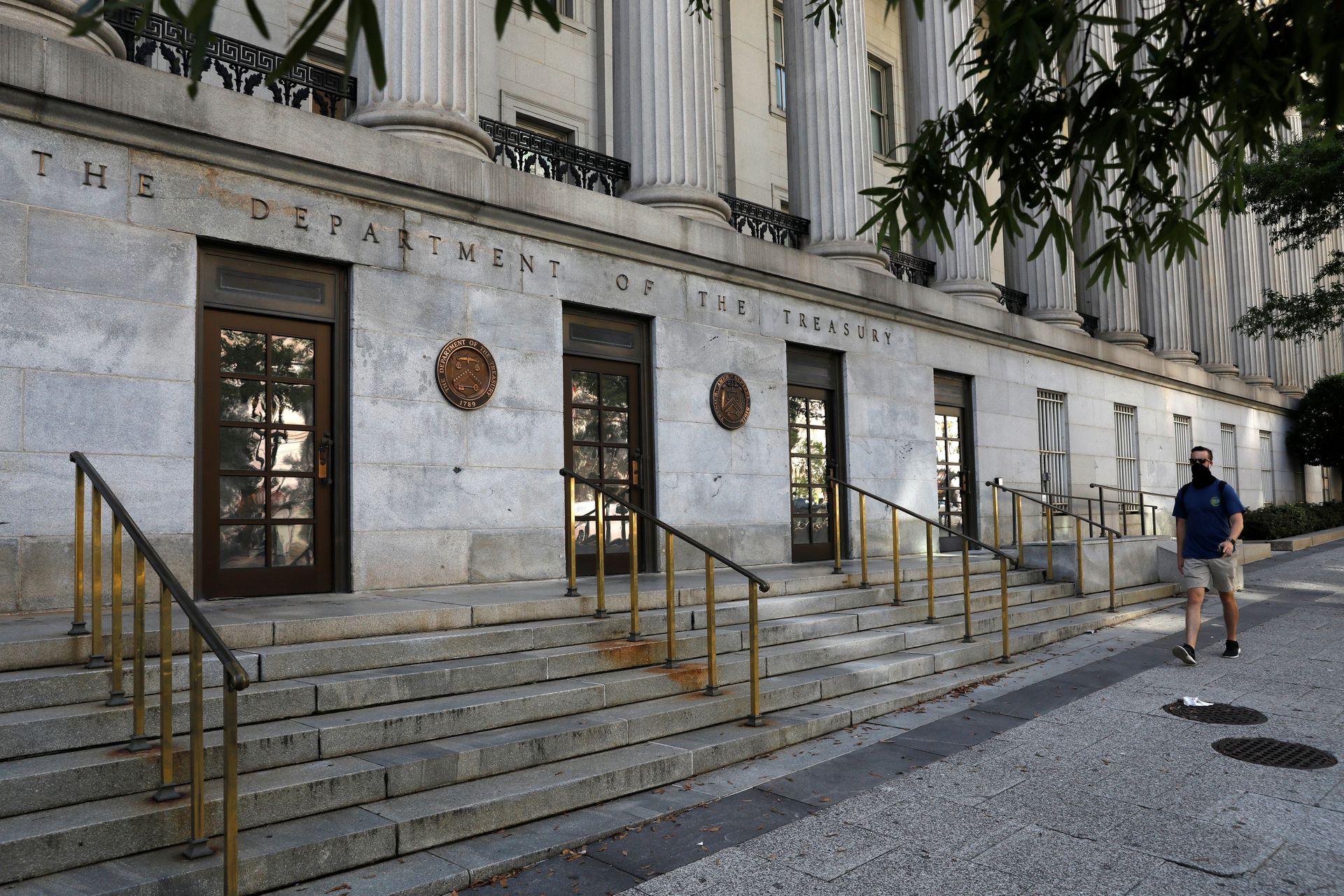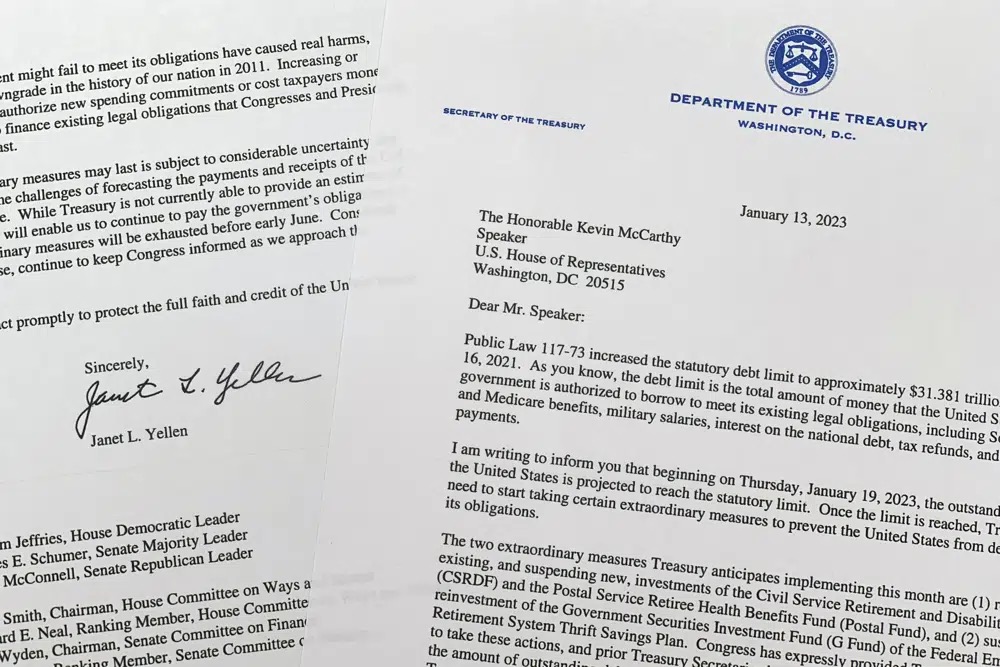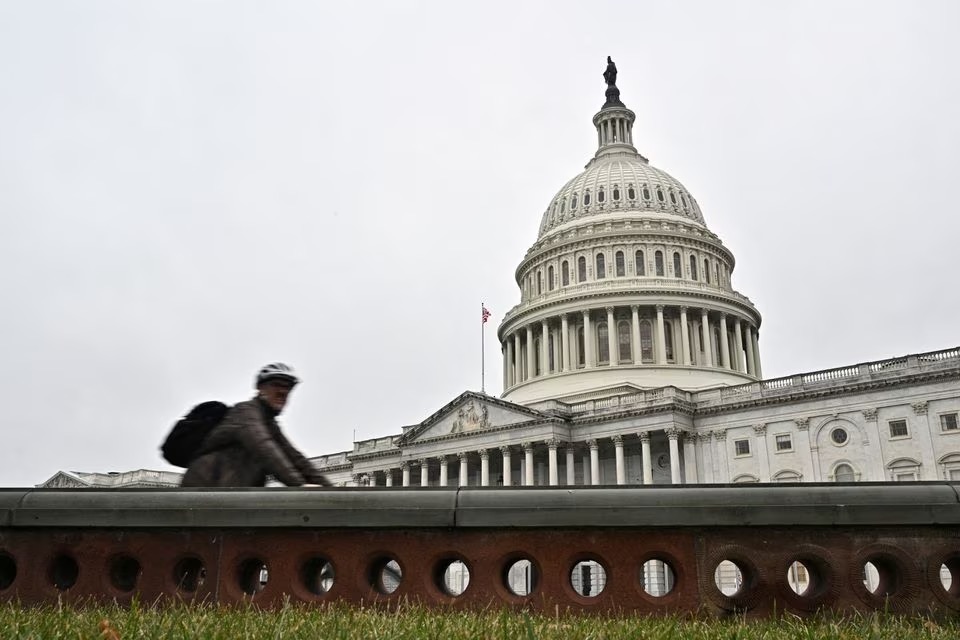
Signage is seen at the U.S. Department of the Treasury headquarters in Washington, D.C., U.S., August 29, 2020. /Reuters
Signage is seen at the U.S. Department of the Treasury headquarters in Washington, D.C., U.S., August 29, 2020. /Reuters
U.S. president Joe Biden arrived in Japan on Thursday for the annual G7 summit. He intends to cut his trip to Asia short and return to the U.S. on Sunday, since he has to continue negotiations with Congressional leaders on raising the country's debt ceiling.
Debates over the debt ceiling have intensified over the past few weeks, putting the U.S. government under pressure to meet the deadline at the end of the month.
In a letter to Congressional leaders this Monday, U.S. Treasury Secretary Janet Yellen warned that the country could face a default on its debt obligations as early as June 1 if Congress fails to raise the borrowing cap. If that happens, the Department of the Treasury will likely be unable to fulfill all of the government's obligations.
Since 2001, the U.S. federal government's budget has run a deficit of nearly $1 trillion every year, according to the Bureau of the Fiscal Service, a part of the U.S. Department of the Treasury.
However, starting from 2016, the growth in spending on Social Security, healthcare, and interest on the federal debt has exceeded the growth of federal revenue, resulting in a situation where the country spends significantly more money than it receives from taxes and other sources of income.
To cover the shortfall, the government needs to borrow in order to sustain the payments that Congress has already approved.
A debt ceiling standoff
The U.S. government hit its $31.4 trillion borrowing limit in January 2023, amid a standoff between Republicans and Democrats on lifting the ceiling.
"Failure to meet the government's obligations would cause irreparable harm to the U.S. economy, the livelihoods of all Americans and global financial stability," Treasury Secretary and former Federal Reserve Chair Janet Yellen wrote to Congress in January 2023.
"Indeed, in the past, even threats the U.S. government might fail to meet its obligations have caused real harm, including the only credit rating downgrade in the history of our nation in 2011."
Now, with the U.S. running up against the debt ceiling deadline, and negotiations between Congress and the White House remaining deadlocked, the issue of the debt ceiling has once again become a contentious topic.
If the two sides can't strike a deal to raise the country's debt ceiling, millions of Americans will feel the impact. The White House states that throughout history, approaching the U.S. debt ceiling has proven to cause big disruptions in financial markets, adversely affecting households and businesses.
The threat of a U.S. default has always made Congress ultimately agree on a deal to raise the debt limit, according to Roger W. Ferguson Jr., an expert in the Council on Foreign Relations (CFR), an independent and nonpartisan membership think tank based in New York.

The letter from Treasury Secretary Janet Yellen to House Speaker Kevin McCarthy of California, photographed Friday, January 13, 2023, notifying Congress that the U.S. is projected to reach its debt limit on January 19, and will then resort to "extraordinary measures" to avoid default. /AP
The letter from Treasury Secretary Janet Yellen to House Speaker Kevin McCarthy of California, photographed Friday, January 13, 2023, notifying Congress that the U.S. is projected to reach its debt limit on January 19, and will then resort to "extraordinary measures" to avoid default. /AP
A prolonged banking turmoil
As the U.S. is grappling with a national debt dilemma, another crisis is putting American confidence in their financial well-being to the test – the bank collapse.
In early May, U.S. regulators seized First Republic Bank and sold its assets to JPMorgan Chase, in a deal to resolve the largest bank failure in the U.S. since the 2008 financial crisis. The move is to put an end to a prolonged banking turmoil that began with the collapse of Silicon Valley Bank and Signature Bank in March.
The collapse of these banks has disrupted the stability of the financial system, as these institutions play a crucial role in facilitating lending, investment and liquidity in the economy.
Meanwhile, job losses in the banking sector have a spillover effect on other industries that rely on banking services, such as real estate and construction. It creates a loss of confidence among investors and consumers, leading to a decrease in lending and investment activities. This contraction in credit availability hampers economic growth and can potentially trigger a recession.
U.S. authorities needed to stay vigilant on new vulnerabilities in the U.S. banking sector, including in regional banks, that could emerge in the adjustment to a much higher interest rate environment, International Monetary Fund spokesperson Julie Kozack said during a news briefing.

A cyclist passes by the U.S. Capitol building on the morning of the first day of the 118th Congress in Washington, D.C., U.S., January 3, 2023. Reuters/Jon Cherry/File Photo
A cyclist passes by the U.S. Capitol building on the morning of the first day of the 118th Congress in Washington, D.C., U.S., January 3, 2023. Reuters/Jon Cherry/File Photo
Uncertain economic outlook
Amid an ongoing banking system crisis, businesses have scaled back investments due to increased borrowing costs. The economy of the nation experienced a slowdown during the first quarter of this year, and the country is now on the verge of a potential debt default in just two weeks.
A U.S. debt default prompted by failure to raise the country's debt ceiling would have "very serious repercussions" for the U.S. economy as well as the global economy, including likely higher borrowing costs, Kozack said.
Although it is unable to fully gauge the damage a possible default would create, economists warn that it could have disastrous economic consequences, especially the volatility across equity, debt and other markets.
"If a default occurs, [the] financial sector will bear [the] brunt first, then [the] service sector," said Qu Qiang, a research fellow at Beijing Foreign Studies University.
As the whole international market is fragile, a real default would have a major impact on the global gross domestic product and employment, Qu told CGTN.
Economic threats won't get out of hand, but could still hurt global recovery prospects, he added.